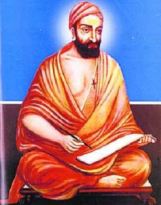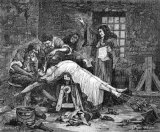 Ignatius of Loyola. Know him? Perhaps not!Jesuits? Know them? Perhaps not! Xavier’s School or Loyola College? Surely, you’ve either studied in one or you’ve heard about this brand and the brand that runs institutions north-south from Kashmir to Kanyakumari and east-west from Kolkata to Khambhat. They call themselves Jesuits and owe their origins and existence to one man: Ignatius of Loyola (1491-1556) whose feast is celebrated on July 31.
Ignatius of Loyola. Know him? Perhaps not!Jesuits? Know them? Perhaps not! Xavier’s School or Loyola College? Surely, you’ve either studied in one or you’ve heard about this brand and the brand that runs institutions north-south from Kashmir to Kanyakumari and east-west from Kolkata to Khambhat. They call themselves Jesuits and owe their origins and existence to one man: Ignatius of Loyola (1491-1556) whose feast is celebrated on July 31.
Indeed, we do know him. An old Spanish soldier who died of syphilis. He founded the Society of Jesus as a personal army for the pope – not for Jesus or his Father in Heaven mind you, but for the pope as his personal army of political provocateurs and agitators.
 Have you seen the A.M.D.G. abbreviation on emblems of Xavier or Loyola institutions and wondered what that meant? I too wondered when I entered a Jesuit school. Seniors told me hat it stood for “Aunty Mary, Dirty Girl!” — a mentally-challenged woman nicknamed “Aunty Mary” who begged near our school-gate. Later I learnt that A.M.D.G. wasn’t coined by Aunty Mary but by Ignatius who, in fact, had sometimes been considered mentally-challenged, but was an expert in challenging, mentally.
Have you seen the A.M.D.G. abbreviation on emblems of Xavier or Loyola institutions and wondered what that meant? I too wondered when I entered a Jesuit school. Seniors told me hat it stood for “Aunty Mary, Dirty Girl!” — a mentally-challenged woman nicknamed “Aunty Mary” who begged near our school-gate. Later I learnt that A.M.D.G. wasn’t coined by Aunty Mary but by Ignatius who, in fact, had sometimes been considered mentally-challenged, but was an expert in challenging, mentally.
Hardly an expert in challenging, mentally. Syphlis makes you mad and he was therefore mentally challenged. But then the Church has a long list of “saints” who were mentally challenged, in need of medical attention. Some were criminally mad. Like Francis Xavier.
 Ignatius was considered mentally “different” since he always thought out of the box. A vanquished Basque warrior, after an arduous pilgrimage, he started a multinational religious organisation, the Society of Jesus. Ignatius loved stargazing and dreamt how his group could be “up there”, gooder than the good and better than the best. That’s why he hit upon the Latin A.M.D.G. — Ad Majorem Dei Gloriam, meaning, “For the greater glory of God”. Ignatius summed this up in another Latin word: magis, meaning, more!
Ignatius was considered mentally “different” since he always thought out of the box. A vanquished Basque warrior, after an arduous pilgrimage, he started a multinational religious organisation, the Society of Jesus. Ignatius loved stargazing and dreamt how his group could be “up there”, gooder than the good and better than the best. That’s why he hit upon the Latin A.M.D.G. — Ad Majorem Dei Gloriam, meaning, “For the greater glory of God”. Ignatius summed this up in another Latin word: magis, meaning, more!
God for Ignatius was the pope or magis-terium. Rule No. 13 of Ignatius’ Rules for Thinking with the Church say: I will believe that the white that I see is black if the hierarchical Church so defines it! This is thinking in the can, not out of the box!
To grasp the import of “more” let’s take an example. Suppose you’re merely “good”, you’d want to be “better” or something “more”. Hence, Ignatius desired that his disciples always seek the “more”, the greater — so that, pumped up by a holy restlessness they’d strive to love God, and all God’s children, with that “more” would make them athirst for excellence.
Good! More good, meaning better! Love God and all of God’s children! Then why has his order been banned at one time or the other in all European countries they operated in except England? When this writer was going to school in Canada – for instance – the term Jesuit was a pejorative term meaning “a sly dissembler”. The OED is not kinder: it defines Jesuitical as meaning dissembling or equivocating. But the Jesuit’s real talent iscasuistry. A casuist is a person who uses clever but false reasoning, Fr. Francis is not clever enough to be a casuist. In this article he succeeds in his objective by leaving out the “best parts” of Jesuits-in-India history. Our objective is to introduce you to a little bit of this history.
True to the dreams of Saint Ignatius, some Jesuits were extraordinary men, likeFrancis Xavier who came to India, and Matteo Ricci who so impressed the Chinese Emperor Wan-li that he was called “Sage of the West”. In India, we’ve had Jesuits like Camile Bulcke who compiled the best English-Hindi dictionary, Carlos Valles, acclaimed author in Gujarati literature and an expert on Jainism, Jerome D’Souza, who was a member of the Constituent Assembly and S. Ignacimuthu, former vice-chancellor of the University of Madras and accomplished scientist.
Yes, they were all experts in their field for a specific reason: for the greater glory of the Pope and Christianism (as this imperialistic ideology is properly called). Camile Bulcke compiled his English-Hindi dictionary to further conversions to Christianism, not out of a love for Hindi. An expert in Jainism must surely be a Jain who practices the Dharma, not a Gujarati Christian littérateur. Overriding the objections of the other Constituent Assembly members, Jerome D’Souza forced through the clause in the Indian Constitution that permits Christian proselytizing, a socially disruptive and anti-national activity that we suffer from till today. We cannot say anything about S. Ignacimuthu himself. But Jesuits have always had a serious interest in science. They, along with Cardinal ‘St.’ Bellarmine, were the first to condemn Galileo for his science! Bellarmine ordered Galileo to abandon theCapernican doctrine — that the earth moved around a stationary sun — and the Jesuits as Pope Paul V’s enforcers, saw to it that Galileo agreed to Bellarmine’s demand. The science of the bully, this!
 As for the arch criminal Francis Xavier, he would be dragged in front of the International Criminal Court for his activities today. He invited the Inquisition to Goa, probably the most cruel and wicked Church court ever to be convened. Paul Williams Roberts writes inThe Empire of the Soul:
As for the arch criminal Francis Xavier, he would be dragged in front of the International Criminal Court for his activities today. He invited the Inquisition to Goa, probably the most cruel and wicked Church court ever to be convened. Paul Williams Roberts writes inThe Empire of the Soul:
“Children were flogged and slowly dismembered in front of their parents, whose eyelids had been sliced off to make sure they missed nothing. Extremities were amputated carefully, so that a person could remain conscious even when all that remained was a torso and head. Male genitals were removed and burned in front of wives, breasts hacked off and vaginas penetrated by swords while husbands were forced to watch…. And it went on for two hundred years.”
This — the Inquisition of Goa — was Francis Xavier’s gift to India! He had an insane hatred of Brahmins, whom he had confronted in the Murugan templeat Tiruchendur. They had defeated him in debate, laughing at his puerile concept of God. He abandoned their company and targeted the fishermen of the Coromandel instead. They did not question his intelligence and were unable to resist his utterly criminal methods of conversion. This is how he converted the fisher folk, in his own words:
“Following the baptisms, the new Christians return to their homes and come back with their wives and families to be in their turn also prepared for baptism. After all have been baptised, I order that everywhere the temples of the false gods be pulled down and idols broken. I know not how to describe in words the joy I feel before the spectacle of pulling down and destroying the idols by the very people who formerly worshipped them.” Xavier did this after the Hindu raja of Quilon had given him a large grant to build churches!
The popular anti-brahman ethnic slur so favoured by today’s Tamil Dravidian politicians, was invented by him. As Belgium scholar Dr. Koenraad Elst has pointed out, anti-brahminism is as evil a prejudice as anti-semitism — though that seems not yet to have registered in the Indian psyche. Xavier wrote to Rome thus:
 “There are in these parts among the pagans a class of men called Brahmins. They are as perverse and wicked a set as can anywhere be found, and to whom applies the Psalm which says: ‘From an unholy race, and wicked and crafty men, deliver me, Lord.’ If it were not for the Brahmins, we should have all the heathens embracing our faith.”
“There are in these parts among the pagans a class of men called Brahmins. They are as perverse and wicked a set as can anywhere be found, and to whom applies the Psalm which says: ‘From an unholy race, and wicked and crafty men, deliver me, Lord.’ If it were not for the Brahmins, we should have all the heathens embracing our faith.”
Sounds just like Tamil Nadu’s outed chief minister Mr. Kalaingar, doesn’t it?
Sita Ram Goel, in History of Hindu-Christian Encounters: AD 304 to 1996, quoting Indian historian T.R. de Souza in his article “Pirates in Priests’ Clothing: Francis Xavier & Robert De Nobili”, writes, “Francis Xavier was convinced that Hindus could not be credited with the intelligence to know what was good for them. They were completely under the spell of the Brahmanas who, in turn, were in league with evil spirits. The first priority in India, therefore, was to free the poor Hindus from the stranglehold of the Brahmanas and destroy the places where evil spirits were worshipped. A bounty for the Church was bound to follow in the form of mass conversions.”
 He continues, quoting De Souza, “At least from 1540 onwards, and in the island of Goa before that year, all the Hindu idols had been annihilated or had disappeared, all the temples had been destroyed and their sites and building materials were in most cases utilised to erect new Christian churches and chapels. Various viceregal and Church council decrees banished the Hindu priests from the Portuguese territories; the public practice of Hindu rites including marriage rites, was banned; the state took upon itself the task of bringing up the Hindu orphan children; the Hindus were denied certain employments, while the Christians were preferred; it was ensured that the Hindus would not harass those who became Christians, and on the contrary, the Hindus were obliged to assemble periodically in churches to listen to preaching or to the refutation of their religion.”
He continues, quoting De Souza, “At least from 1540 onwards, and in the island of Goa before that year, all the Hindu idols had been annihilated or had disappeared, all the temples had been destroyed and their sites and building materials were in most cases utilised to erect new Christian churches and chapels. Various viceregal and Church council decrees banished the Hindu priests from the Portuguese territories; the public practice of Hindu rites including marriage rites, was banned; the state took upon itself the task of bringing up the Hindu orphan children; the Hindus were denied certain employments, while the Christians were preferred; it was ensured that the Hindus would not harass those who became Christians, and on the contrary, the Hindus were obliged to assemble periodically in churches to listen to preaching or to the refutation of their religion.” De Souza says about the missionaries, “A particularly grave abuse was practiced in Goa in the form of ‘mass baptism’ and what went before it. The practice was begun by the Jesuits and was later initiated by the Franciscans also. The Jesuits staged an annual mass baptism on the Feast of the Conversion of St. Paul (25 January), and in order to secure as many neophytes as possible, a few days before the ceremony the Jesuits would go through the streets of the Hindu quarters in pairs, accompanied by their Negro slaves, whom they would urge to seize the Hindus. When the blacks caught up a fugitive, they would smear his lips with a piece of beef, making him an ‘untouchable’ among his people. Conversion to Christianity was then his only option.”
De Souza says about the missionaries, “A particularly grave abuse was practiced in Goa in the form of ‘mass baptism’ and what went before it. The practice was begun by the Jesuits and was later initiated by the Franciscans also. The Jesuits staged an annual mass baptism on the Feast of the Conversion of St. Paul (25 January), and in order to secure as many neophytes as possible, a few days before the ceremony the Jesuits would go through the streets of the Hindu quarters in pairs, accompanied by their Negro slaves, whom they would urge to seize the Hindus. When the blacks caught up a fugitive, they would smear his lips with a piece of beef, making him an ‘untouchable’ among his people. Conversion to Christianity was then his only option.”
Under the title “Financing Church Growth”, De Souza concludes, “… the government transferred to the Church and religious orders the properties and other sources of revenue that had belonged to the Hindu temples that had been demolished or to the temple servants who had been converted or banished. Entire villages were taken over at times for being considered rebellious and handed over with all their revenues to the Jesuits. In the villages that had submitted themselves, at times en masse, to being converted, the religious orders promoted competition to build bigger and bigger churches and more chapels than their neighbouring villages. Such a competition, drawing funds and diverting labour, from other important welfare works of the village, was decisively bringing the village economy in Goa into bankruptcy.”
Sita Ram Goel concludes with this observation: “It was a very difficult situation for Hinduism. But, by and large, Hindus chose to stay in the faith of their forefathers in spite of all trials and temptations. There was no mass movement towards the Church except the “mass baptisms” staged by the Jesuits. The mission was in a fix. The strategy of forced conversions recommended by Francis Xavier had failed.
 The other clever Jesuit missionary Fr. Francis doesn’t mention, Robert de Nobili, tried a quite different tactic, that of forgery, deceit and impersonation. Sita Ram Goel writes, “Another Jesuit, Robert de Nobili, came forward with a new strategy. When he came to the Madura Mission in 1606, he had found it a “desert” in terms of conversions. He had also seen that Hindus had retained their reverence for theBrahmanas in spite of missionary insinuations. So he decided that he would disguise himself as a Brahmana and preach the gospel by other means. The story is well-known — how he put on an ochre robe, wore the sacred thread, grew a tuft of hair on his head, took to vegetarian food, etc., in order to pass as a Brahmana. He also composed some books in Tamil and Sanskrit, particularly the one [called Yesuveda in which he had copied verses from the New Testament and slokas from theYajurveda] which he palmed off as the Yajurveda. When some Hindus suspected from the colour of his skin that he was a Christian, he lied with a straight face that he was a high-born Brahmana from Rome!
The other clever Jesuit missionary Fr. Francis doesn’t mention, Robert de Nobili, tried a quite different tactic, that of forgery, deceit and impersonation. Sita Ram Goel writes, “Another Jesuit, Robert de Nobili, came forward with a new strategy. When he came to the Madura Mission in 1606, he had found it a “desert” in terms of conversions. He had also seen that Hindus had retained their reverence for theBrahmanas in spite of missionary insinuations. So he decided that he would disguise himself as a Brahmana and preach the gospel by other means. The story is well-known — how he put on an ochre robe, wore the sacred thread, grew a tuft of hair on his head, took to vegetarian food, etc., in order to pass as a Brahmana. He also composed some books in Tamil and Sanskrit, particularly the one [called Yesuveda in which he had copied verses from the New Testament and slokas from theYajurveda] which he palmed off as the Yajurveda. When some Hindus suspected from the colour of his skin that he was a Christian, he lied with a straight face that he was a high-born Brahmana from Rome!
“Some Christian historians credit De Nobili with converting a hundred thousand Hindus. Others put the figure at a few hundred. But all agree that his converts melted away very fast soon after he was exposed by other [Protestant] missionaries who were either jealous of him or did not like his methods. Christian theologians hail him as the pioneer of Indigenisation in India and the founder of the first Christian Ashram. A truly ethical criterion would dismiss him as a desperate and despicable scoundrel.
 “One wonders how Hinduism would have fared in South India if its encounter with Christianity under the Portuguese dispensation had continued uninterrupted. Hindus were helpless wherever Portuguese power prevailed and Hindus outside could not help as they themselves were groaning under the heel of Islamic imperialism after the defeat of the Vijayanagara Empire by a Muslim alliance in 1565 AD. The situation was saved by the Dutch in the second quarter of the seventeenth century. The Dutch destroyed the maritime monopoly of the Portuguese and drove them out of Malabar and southern Tamil Nadu. Christianity had to break its encounter with Hinduism except in the small Portuguese enclaves where it continued for two more centuries. But most of the heat applied on Hinduism had to be taken off because “the fear of retaliatory raids by the powerful Marathas in the neighbourhood acted as an effective check on the missionary zeal and coercion.”
“One wonders how Hinduism would have fared in South India if its encounter with Christianity under the Portuguese dispensation had continued uninterrupted. Hindus were helpless wherever Portuguese power prevailed and Hindus outside could not help as they themselves were groaning under the heel of Islamic imperialism after the defeat of the Vijayanagara Empire by a Muslim alliance in 1565 AD. The situation was saved by the Dutch in the second quarter of the seventeenth century. The Dutch destroyed the maritime monopoly of the Portuguese and drove them out of Malabar and southern Tamil Nadu. Christianity had to break its encounter with Hinduism except in the small Portuguese enclaves where it continued for two more centuries. But most of the heat applied on Hinduism had to be taken off because “the fear of retaliatory raids by the powerful Marathas in the neighbourhood acted as an effective check on the missionary zeal and coercion.” Lastly, we are obliged to point out that it was Jesuits working with Madame Dupleix, wife of the French governor of Pondicherry, who destroyed the Vedapuri Iswaran Temple in Pondicherry, the site now being occupied by the Cathedral of Our Lady of the Immaculate Conception. Jesuits along with Franciscans, Augustinians and the Portuguese, had a hand in destroying the original Kapaleeswara Temple on the Mylapore seashore that is now occupied by Santhome Cathedral and, to the south, Bishop’s House.
Lastly, we are obliged to point out that it was Jesuits working with Madame Dupleix, wife of the French governor of Pondicherry, who destroyed the Vedapuri Iswaran Temple in Pondicherry, the site now being occupied by the Cathedral of Our Lady of the Immaculate Conception. Jesuits along with Franciscans, Augustinians and the Portuguese, had a hand in destroying the original Kapaleeswara Temple on the Mylapore seashore that is now occupied by Santhome Cathedral and, to the south, Bishop’s House.
What makes Jesuits tick? In his book Heroic Leadership. Chris Lowney reveals the values that have guided the Jesuits for more than 450 years: self-awareness, ingenuity, love and heroism. Ignatius taught his shishyas methods of prayer famously known as “Spiritual Exercises” aimed at making one aware of inner dispositions and spiritual depths.
 Yes, we know from Chris Lowney what make Jesuits tick. He was a priest who used his Jesuit training to become a J.P. Morgan banker. So it is really business before prayer! So typical! But hidden under this cloak of a suave urbanity is the firm belief that the employment of any means however unethical is justified to obtain a religious or political objective. Or business objective. We know what J.P. Morgan & Co. has been up to under the guidance of a lapsed Jesuit priest! Their credit exposure to financial derivatives was 400 to 1!
Yes, we know from Chris Lowney what make Jesuits tick. He was a priest who used his Jesuit training to become a J.P. Morgan banker. So it is really business before prayer! So typical! But hidden under this cloak of a suave urbanity is the firm belief that the employment of any means however unethical is justified to obtain a religious or political objective. Or business objective. We know what J.P. Morgan & Co. has been up to under the guidance of a lapsed Jesuit priest! Their credit exposure to financial derivatives was 400 to 1!
As for the old soldier’s spiritual exercises, they are nothing more than self-indoctrination. This indoctrination then becomes a Jesuit’s inner disposition which, as we have seen, is deceitful to the point of criminality. The question of spiritual depth in a Jesuit does not arise.
Ingenuity is about keeping pace with a fast-changing world. Describing himself as a “pilgrim”, Ignatius wanted Jesuits to be ever on the move – dreaming impossible dreams and building new bridges. The ideal Jesuit was to be one with one foot raised, ever ready to respond to emerging exigencies.
 We will give it to them: they were always ready to run away when they were caught in their Machiavellianmischief-making. This was facilitated by their up-to-date knowledge of the current rate of exchange for the rupee and dollar. When we visited Rome we always changed money at the private bank in Jesuit headquarters. They give the best rate of exchange and we recommend them to every Indian tourist in the Eternal City.
We will give it to them: they were always ready to run away when they were caught in their Machiavellianmischief-making. This was facilitated by their up-to-date knowledge of the current rate of exchange for the rupee and dollar. When we visited Rome we always changed money at the private bank in Jesuit headquarters. They give the best rate of exchange and we recommend them to every Indian tourist in the Eternal City.
The name Ignatius derives from Ignis, the Latin equivalent of Agni, fire. Like mythical Prometheus who gifted humankind with fire, Ignatius inspired Jesuits to be fires that would enkindle other fires. Obviously, that doesn’t always happen. One often sees thanda Jesuits who mouth magis slogans with “minimus” output. Jesuitical, indeed!
 Indeed! And the fires they have most often ignited are those of torture, sedition and rebellion. Remember the LTTE and theMaoists in Orissa? One disbanded and the other still banded. Both Jesuit-inspired and it is said, Church-financed.
Indeed! And the fires they have most often ignited are those of torture, sedition and rebellion. Remember the LTTE and theMaoists in Orissa? One disbanded and the other still banded. Both Jesuit-inspired and it is said, Church-financed.
H.G. Wells wrote in his book Crux Ansata: An Indictment of the Roman Catholic Church:
“The Jesuits work had to be propaganda, teaching and the insinuation by every possible means of the authority and policy of the Church…. Unfortunately for the world, the Jesuits have never been able to keep clear of politics. It was against their written professions, if these are to be taken seriously, but it was manifestly among their inevitable temptations. They had their share, direct an indirect, in embroiling states, concocting conspiracies and kindling wars…. We need not expand this indictment further. Almost every country in Europe except had at one time or another bee provoked to expel the Jesuits, and … their obdurate persistence in evil-doing continues to this day.”
Anyone familiar with the Loyola or Xavier brand will look up with pride at that man – nay, that “more” than other mortals, Ignatius – who did everything A.M.D.G — for the greater glory of God!
 The syphilitic warrior’s successors, who are known as “Black Popes”, are credited with the murder of Pope John-Paul I among others before him. He did not approve of their acquired Marxist bent of mind, called Liberation Theology, and regarded them as traitors to himself and the Church. He was going to have the order disbanded. But the alleged Jesuit assassin got to him first with the poisoned cup – for the greater glory of … themselves! They are still with us, unfortunately!
The syphilitic warrior’s successors, who are known as “Black Popes”, are credited with the murder of Pope John-Paul I among others before him. He did not approve of their acquired Marxist bent of mind, called Liberation Theology, and regarded them as traitors to himself and the Church. He was going to have the order disbanded. But the alleged Jesuit assassin got to him first with the poisoned cup – for the greater glory of … themselves! They are still with us, unfortunately!Authors
» Fr. Francis Gonsalves SJ is the principal of the Vidyajyoti College of Theology, Delhi. He is involved in interfaith dialogue and peoples’ initiatives for fostering justice, harmony and peace. He can be contacted at fragons@gmail.com
» Ishwar Sharan is the author of The Myth of Saint Thomas and the Mylapore Shiva Temple. He feels Indians would benefit more by studying the history of Christianism in India than Christian theology (which does not stand a chance before Hindu metaphysics anyway). He is opposed to interfaith dialogue as it has never been in the interest of Hindus or Hindu Dharma. Jesuits target uninformed and witless Hindu leaders for their dialogue sessions (the exception being Arun Shourie), which they then manipulate in their own criminal interest.
References
- The Jesuit Oath of Induction
- The Jesuit Oath Debunked
- Ignatius Loyola’s Rules for Thinking with the Church
- Ignatius Loyola’s Spiritual Exercises
- Sita Ram Goel: Jesus Christ: An Artifice for Aggression
- Sita Ram Goel: History of Hindu-Christian Encounters: AD 304 to 1996
- Sita Ram Goel: Catholic Ashrams: Sannyasins or Swindlers?
- Sita Ram Goel: Pirates in Priests’ Clothing
- Koenraad Elst: Psychology of Prophetism: A Secular Look at the Bible
- Swami Devananda Saraswati: Atma Jyoti Ashram: Sannyasis or Snake Oil Salesmen?
- Nithin Sridhar: Inculturation: Fooling the Hindu Masses
- H.G. Well: Crux Ansata: An Indictment of the Roman Catholic Church
- Ananda Ranga Pillai: Private Diary
- Paul Williams Roberts: The Empire of the Soul:
- Avro Manhattan’s The Vatican Billions
- All Joseph McCabe’s books
- Malachi Martin: The Jesuits and the Betrayal of the Roman Catholic Church

No comments:
Post a Comment